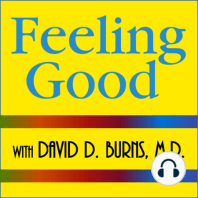50 min listen

205: How to Crush Negative Thoughts: Should Statements
205: How to Crush Negative Thoughts: Should Statements
ratings:
Length:
44 minutes
Released:
Aug 24, 2020
Format:
Podcast episode
Description
Today, the Cognitive Distortion Starter Kit Continues with Should Statements Rhonda begins by reading a beautiful email from one of our listeners, and I give a brief shout out for my new book, Feeling Great, which can be pre-ordered on Amazon now (see below for the link). Thanks to your support, as of today (July 2) it is already the #1 best seller in the Amazon depression AND anxiety categories for impending new books! David and Rhonda briefly summarize the history of Should Statements, starting with the Buddha 2500 years ago, and culminating in the work of Karen Horney and Albert Ellis in the 20th century. They both emphasized that nearly all emotional suffering as well as relationship conflict results from “Shoulds.” David and Rhonda describe the four categories of Should Statements: Shoulds directed against yourself cause depression, anxiety, guilt, and shame. and even lead to suicidal urges. Should directed against others cause anger, and can even lead to violence. Shoulds directed against the world cause frustration. Hidden Shoulds. They also describe the three valid types of Should Statements: Moral Shoulds Legal Shoulds Laws of the Universe Shoulds David and Rhonda provide vignettes illustrating the tremendous emotional damage that can result from “Shoulds” and describe a number of strategies for combating them, including: Positive Reframing the Semantic Technique Socratic Questioning the Acceptance Paradox The final podcast in this series will focus on the two types of Blame: Self-Blame, which nearly always marches hand-in-hand with Self-Directed Shoulds Other-Blame, which nearly always marches hand-in-hand with Other-Directed Shoulds Rhonda and David
Released:
Aug 24, 2020
Format:
Podcast episode
More Episodes from Feeling Good Podcast | TEAM-CBT - The New Mood Therapy
394: Report on Social Anxiety Marathon: Featured photo is Dr. Jacob Towery Report on the 2nd Annual Social Anxiety Marathon Finding Humans Less Scary 2.0 Led by Jacob Towery, MD (above) and Michael Luo, MD (below) Today, Drs. Jacob Towery and Michael Luo report on the... by Feeling Good Podcast | TEAM-CBT - The New Mood Therapy